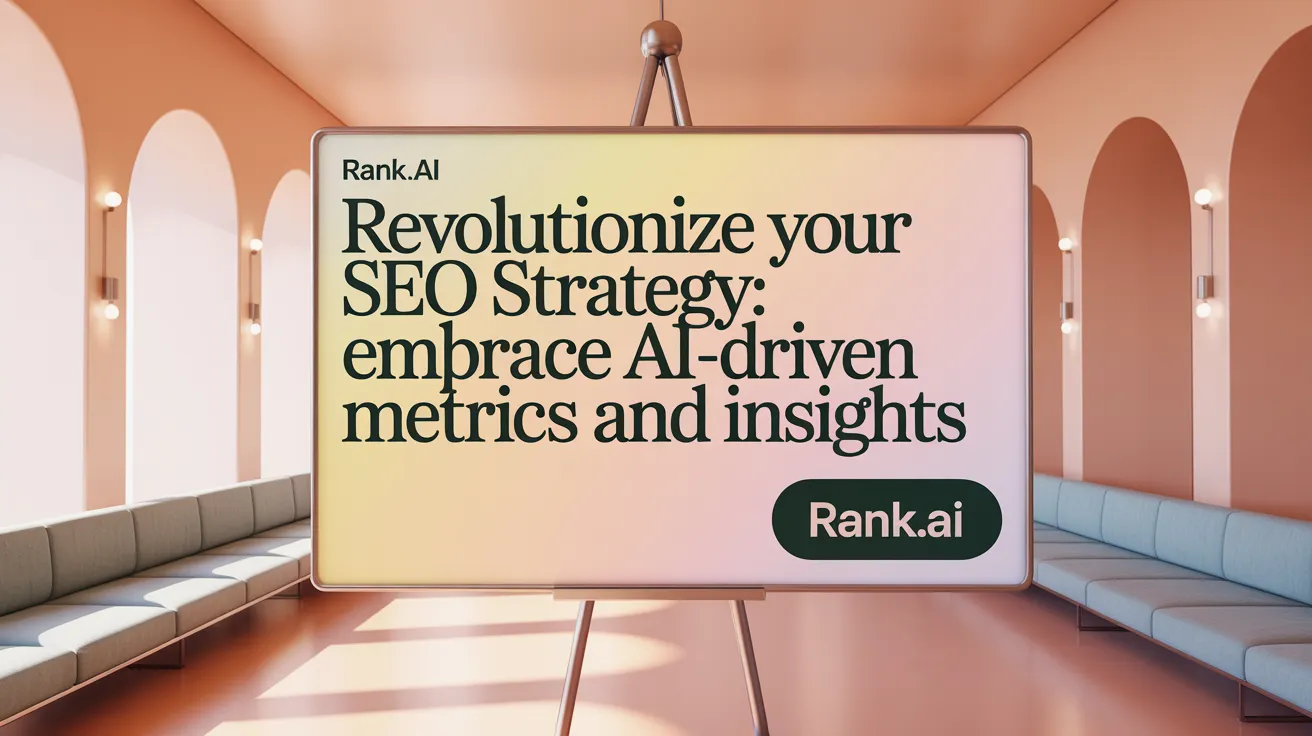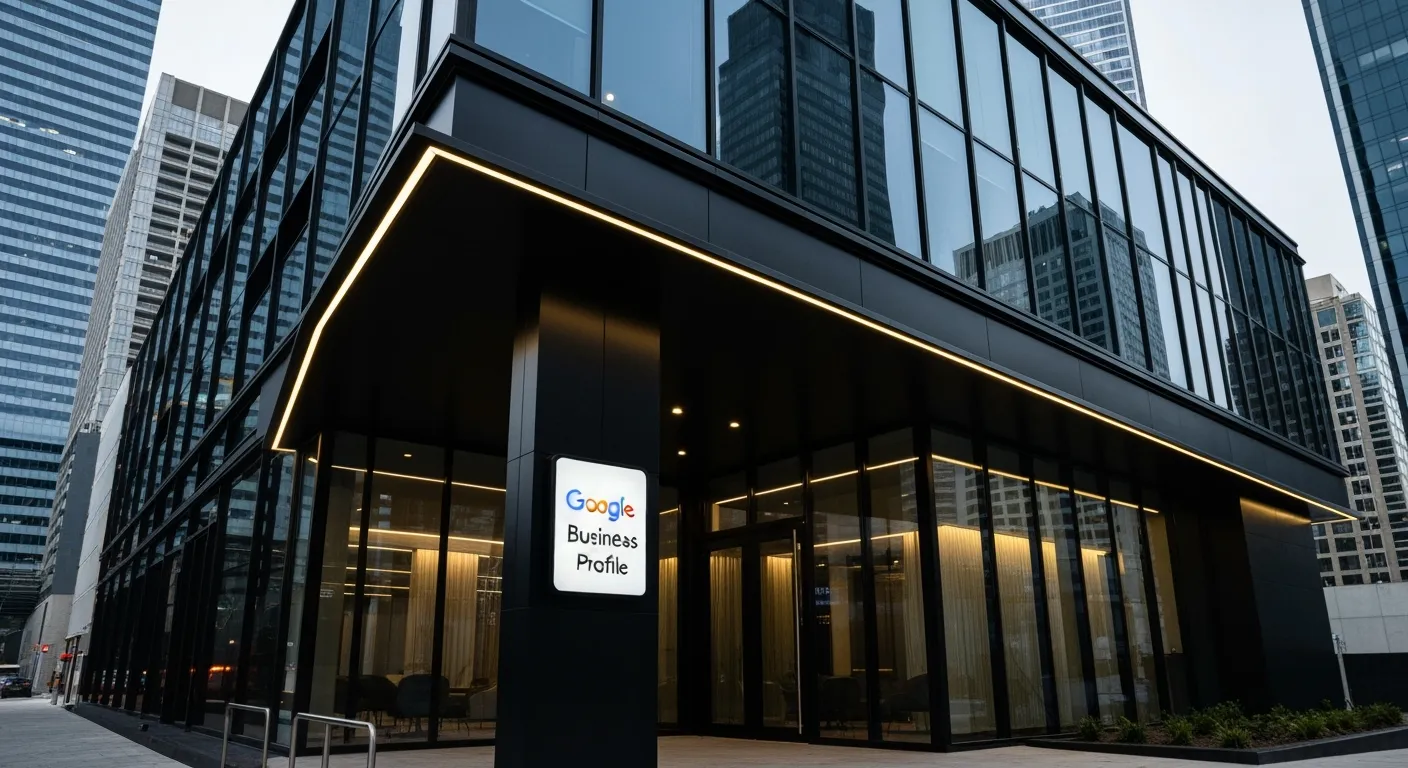Tracking SEO Metrics with AI-Driven Dashboards
Revolutionizing SEO Insights: Harnessing AI-Powered Dashboards for Smarter Analytics

The Shift Towards AI-Enhanced SEO Measurement
As artificial intelligence reshapes the digital landscape, traditional SEO metrics alone no longer paint a complete picture of search performance. The emergence of AI-driven search features and answer engines has transformed how visibility, user engagement, and brand authority are measured. This article explores how AI-powered dashboards revolutionize SEO metrics tracking, enabling marketers to navigate complex data streams and extract actionable insights in real time, aligning SEO efforts with evolving search behaviors and business objectives.
Transforming SEO Metrics in the Age of AI

How has AI changed traditional SEO metrics?
AI has fundamentally reshaped how SEO success is measured. Whereas traditional metrics focused heavily on clicks and organic traffic, AI-powered search introduces a new dynamic with generative search experiences (SGE). Features like AI-generated snippets, knowledge panels, and voice or chatbot interfaces boost impressions dramatically but often reduce clicks. This is because users frequently obtain the information they need directly on the search results page without visiting a site (Impact of AI on SEO Metrics, AI SEO dashboard analytics).
Impact of AI on traditional SEO metrics
The rise of AI means impressions no longer directly translate to visits, making click-through rate (CTR) a less reliable indicator. Furthermore, metrics like keyword rankings and organic traffic now need to be understood in the context of AI-generated answer boxes and summaries. Visibility in these AI features becomes crucial as they enhance brand exposure even without driving traffic (Measuring SEO Success with AI, SEO Metrics That Matter).
Rise of zero-click and answer-based search results
Over 60% of Google searches end without any clicks, highlighting the dramatic rise of zero-click searches. AI-powered answer engines deliver curated responses, diminishing the importance of driving clicks but increasing indirect user engagement and brand recognition. This shift requires marketers to track new metrics such as AI mentions, brand visibility in AI summaries, and citations within AI-generated content (AI visibility metrics, SEO Metrics for AI).
Limitations of conventional metrics like clicks and impressions
Traditional SEO metrics like clicks and impressions are increasingly insufficient because they do not capture the full picture of user engagement in an AI-driven search landscape. AI summaries often cite content without linking back, decoupling visibility from traffic. Therefore, new metrics focused on AI visibility, semantic relevance, and engagement quality offer more accurate assessments of SEO performance today (Reinterpreting Traditional SEO Metrics, AI-driven content recommendation metrics).
Essential Modern SEO Metrics to Track with AI Influence
What modern SEO metrics are important when accounting for AI?
The evolution of AI in search engines demands updated metrics beyond traditional SEO measurements. Metrics now emphasize visibility in AI-powered search features, including AI Overviews, snippets, and answer panels. Monitoring brand search volume and topical authority becomes crucial as AI synthesizes and cites content without always linking directly (Measuring SEO Success with AI, SEO Metrics for AI, AI-powered SEO analytics, generative search experiences (SGE), generative engine optimization (GEO)).
New SEO metrics emphasizing AI visibility and brand exposure
- AI Citation Frequency: How often AI platforms reference your content.
- AI Overview Presence: Inclusion of your content in AI-generated summaries, such as Google's AI Overviews.
- Share of Voice in AI Responses: Measures your brand's prominence in AI answers compared to competitors.
These metrics reflect brand exposure in a landscape where clicks may decline but recognition and indirect engagement rise (AI visibility metrics, SEO Brand Authority, Brand Exposure through AI Search, AI SEO monitoring tools.
Engagement metrics reflecting user intent and quality
Traditional metrics like organic traffic are complemented by dwell time, scroll depth, and assisted conversions to capture how effectively content matches user intent. Longer engagement signals relevant, high-quality content in AI-driven search contexts (Engagement Metrics for SEO, SEO Metrics That Matter, SEO Site Checkup tools, Organic traffic).
Importance of monitoring AI-specific features like AI Overviews and citations
Tracking AI-specific features needs tailored tools to understand your performance in AI search results. This includes monitoring AI brand mentions, citations linked in AI answers, and prompt-triggered visibility. This data helps reshape strategies to optimize for AI search environments rather than just clicks or rankings (AI SEO monitoring tools, AI-powered SEO Tools, AI SEO dashboard analytics, AI-Assisted Dashboards).
Embracing these modern metrics allows SEO professionals to navigate the AI-transformed search landscape effectively, focusing on quality, intent, and comprehensive visibility rather than traditional volume-driven metrics alone (Complete Guide to SEO Tracking 2025, SEO Results, AI SEO dashboard analytics, SEO Tracking Guide).
Integrating AI-Assisted Dashboards for Real-Time SEO Insights

How do AI-assisted dashboards enhance SEO tracking?
AI-assisted dashboards revolutionize SEO tracking by offering dynamic and interactive data visualizations tailored for real-time analysis. With features such as natural language querying, users can ask complex SEO-related questions in plain language and instantly receive visual responses. This accelerates the understanding of SEO data trends and performance metrics without requiring deep technical skills.
These dashboards integrate directly with live streaming data pipelines, which provide up-to-the-minute insights into metrics like organic traffic fluctuations, AI-generated content mentions, and search engine visibility shifts. AI capabilities include anomaly detection, allowing marketers to swiftly identify unusual changes or potential issues in SEO performance, such as sudden drops in click-through rates or indexing errors.
Moreover, AI dashboards support comprehensive exploration with dynamic parameters and scheduling, making continuous monitoring efficient and customizable. The inclusion of AI-generated narratives helps interpret the data, highlighting correlations and underlying causes behind performance changes.
Capabilities of AI/BI dashboards in tracking SEO data
- Real-time connection to multiple SEO data sources like search consoles, analytics platforms, and AI mention trackers (AI-assisted dashboards
- Data governance through unified cataloging, ensuring secure and reliable information flows (Unity Catalog data governance
- Interactive visualizations including charts, heat maps, and tables that update automatically with fresh SEO metrics
- Automated alerts for critical SEO changes such as indexing errors, ranking fluctuations, or spikes in AI citations (Automated alerts in analytics)
Features like natural language querying and anomaly detection
- Natural Language Querying (NLQ) lets users pose SEO questions naturally (e.g., "What was our organic traffic last week?") and receive instant visual feedback (Natural language data visualization
- Anomaly detection identifies outliers or sudden shifts in SEO data, prompting early investigations and rapid response (Anomaly detection with AI dashboards)
- AI-generated insights explain the reasons behind data trends, aiding clear communication to stakeholders (Using AI for automated insight generation)
Benefits of real-time analytics and dynamic visualization
- Enables prompt decisions to capitalize on emerging SEO opportunities or mitigate risks (Real-time analytics benefits)
- Facilitates continuous performance monitoring without manual data consolidation (Scaling reporting with AI
- Improves collaboration by making complex SEO data accessible to all team members irrespective of technical background
- Enhances the ability to track AI-specific SEO impacts, accommodating the evolving digital landscape (SEO Metrics for AI-powered SERPs
By leveraging AI-assisted dashboards, SEO professionals can elevate their measurement capabilities, adapt quickly to search algorithm changes, and demonstrate quantifiable improvements in SEO strategies (Measuring SEO Success with AI).
AI-Driven Platforms Monitoring SEO and AI Visibility
What role do AI-driven analytics platforms play in SEO?
AI-driven analytics platforms have become essential tools in modern SEO by overseeing enormous datasets from millions of websites and billions of AI-generated queries. They specialize in tracking AI mentions and brand visibility within generative search experiences (SGE) engine results, such as AI Overviews and summary citations, which traditional SEO tools struggle to measure effectively (SEO Metrics for AI Powered SERPs, AI SEO Concepts).
These platforms provide advanced competitive intelligence, keeping users informed on how their SEO performance stands relative to competitors, including visibility in AI-powered search environments (AI-powered Search Interfaces, Competitive SEO Analysis). Customizable dashboards aggregate both conventional SEO metrics like organic traffic and keyword rankings alongside AI-specific indicators such as AI Citation Share and AI Overview presence (AI-powered SEO analytics, AI SEO dashboard analytics.
By offering dynamic reporting and real-time analytics, these tools enable SEO professionals to monitor evolving AI-driven search trends and adapt strategies accordingly (AI-driven reporting and dashboards, Analytical dashboard AI tool benefits. Their integration supports a comprehensive understanding of search performance at scale, ensuring SEO efforts remain aligned with the rapidly shifting landscape of AI-powered search visibility and user engagement (Measuring SEO Success, SEO Metrics Overview.
Reevaluating Traditional SEO Metrics in the AI Era
Are traditional SEO metrics still relevant with AI changes?
Traditional SEO metrics such as clicks, impressions, and keyword rankings continue to play an important role in measuring SEO performance. However, the way these metrics should be interpreted has shifted significantly due to AI-driven search changes.
AI-powered search features, including snippets, knowledge panels, and AI Overviews, increasingly provide direct answers to user queries within the search results themselves. This leads to the rise of zero-click searches, where users get their information without clicking through to a website. Consequently, while impressions may increase due to enhanced AI features, clicks often decline, reflecting a new form of user engagement rather than reduced visibility (Declining Clicks vs Increasing Impressions.
Therefore, clicks and rankings remain relevant but require reinterpretation. Stable or high rankings can still indicate that your content is authoritative since AI systems often source information from top-ranked pages even if users don't click through (Role of Social Media in AI Search. Impressions now also include visibility in AI-enhanced search features, broadening the traditional definition.
At the same time, tracking technical SEO health metrics, such as Core Web Vitals, crawl errors, index coverage, and page speed, remains critical. These factors help ensure that your site remains accessible, user-friendly, and authoritative in the eyes of search engines, laying the foundation for both traditional and AI-powered visibility.
In summary, while traditional SEO metrics are still useful, SEO strategy and reporting must adapt to include AI-specific visibility metrics and maintain a strong focus on technical site health to succeed in the evolving search landscape.
Building an AI-Powered SEO Reporting Stack
How can SEO teams structure AI-powered reporting workflows?
SEO teams can construct efficient AI-powered reporting workflows by automating data collection from various SEO tools and sources. This involves integrating traditional SEO metrics such as organic traffic, keyword rankings, and CTR, with emerging AI-specific indicators like AI citation shares, AI overview visibility, and brand mentions within AI-generated answers.
Automation pipelines streamline the gathering and processing of these diverse data sets, while advanced AI software generates natural language narratives that translate complex analytics into easy-to-understand insights. This practice helps stakeholders quickly grasp SEO performance and opportunities (AI-driven reporting and dashboards).
Layered Reporting Cadence from Daily Alerts to Quarterly Reviews
Establishing a structured reporting cadence is critical. SEO teams deploy daily alerts for immediate issues like indexing errors or ranking drops, enabling timely remediation (SEO Tracking for Agencies. Weekly and bi-weekly reports focus on tactical updates, highlighting fluctuations in AI visibility and engagement metrics.
Monthly and quarterly comprehensive reports provide strategic overviews, combining AI and traditional signals to evaluate SEO’s business impact (SEO Results). This multi-tiered frequency ensures continuous monitoring and informed decision-making.
Integration of AI Signals into Dashboards for Actionable Insights
Modern SEO dashboards incorporate AI-driven metrics alongside classic SEO KPIs. Tools leverage generative AI to offer dynamic visualization and contextual explanations (AI in Data Dashboards, allowing teams to track AI-driven brand exposure, semantic coverage, and engagement deeply (AI SEO dashboard analytics.
Secure, interactive dashboards provide access across organizations, empowering marketing, content, and technical teams to align on objectives and swiftly adapt strategies based on AI-powered insights (AI-powered analytical dashboards.
| Component | Description | Benefit |
|---|---|---|
| Data Collection & Automation | Integrate multiple SEO and AI tools, automate pipelines | Ensures real-time, comprehensive data feed (AI SEO Monitoring Tools |
| Narrative Generation | AI-generated reports in natural language | Simplifies complex data for faster stakeholder adoption (AI-driven reporting and dashboards |
| Layered Reporting Cadence | Daily alerts, weekly summaries, monthly and quarterly reports | Promotes continuous oversight and strategic planning (SEO Tracking Guide |
| AI-Powered Dashboards | Combine traditional and AI SEO metrics with interactive visuals | Enhances decision-making and cross-team collaboration (Modern AI-Powered SEO Dashboards |
Leveraging AI for Automated SEO Workflow and Content Optimization

How is AI used to automate SEO workflows?
AI is revolutionizing SEO workflows by automating repetitive and time-consuming tasks. This includes keyword research, topic analysis, content creation, and on-page optimization. AI tools like Surfer SEO analyze top-ranking pages to recommend improvements in keyword density and structure. Jasper.ai and similar platforms employ GPT-3 and other language models to generate high-quality, SEO-friendly content, such as blog posts and meta descriptions, with minimal human intervention.
Automation of keyword research and content creation
AI enhances keyword research by predicting which keywords will drive traffic based on search trends and competitive data. It suggests relevant keywords automatically and clusters them for topical authority building. In content creation, AI-powered tools automate writing by crafting outlines, generating drafts, and optimizing text for readability and search intent. This streamlines the content development process, saving time while maintaining quality. For a list of the best SEO tools 2025 that support these features, you can explore top-rated free and paid tools.
AI tools assisting on-page and technical SEO tasks
Beyond content, AI assists in technical SEO, performing website audits rapidly to detect issues like broken links, crawl errors, and duplicate content. AI can generate XML sitemaps, optimize meta tags, evaluate mobile-friendliness, and recommend structured data and schema markup to enhance search visibility. These tools provide actionable insights that contribute to improved user experience and search rankings. Learn more about technical SEO improvement with AI and structured data and schema markup.
Benefits of AI in enhancing SEO efficiency and accuracy
The integration of AI in SEO improves operational efficiency by reducing manual labor and accelerating data analysis. AI-driven insights increase accuracy through real-time monitoring and prediction, enabling SEOs to adapt strategies swiftly. AI also augments human expertise by providing data-backed recommendations and facilitating large-scale optimization workflows, helping teams maintain competitive advantage in dynamic search environments. Explore the impact of AI on SEO metrics and monitoring and how AI elevates SEO dashboard analytics.
Key SEO KPIs Aligned with Business Objectives
What SEO KPIs should align with business goals?
SEO KPIs that align with overarching business objectives incorporate multiple dimensions to truly gauge marketing effectiveness. These include:
- Visibility Scorecard: Measures presence in traditional search results and AI-driven features like AI Overviews and snippets, highlighting brand exposure beyond clicks.
- Engagement Scorecard: Tracks user interaction metrics such as dwell time, scroll depth, and assisted conversions to confirm content relevance and retention (Engagement Metrics for SEO.
- Authority Scorecard: Focuses on backlinks from authoritative sources, domain trustworthiness, brand sentiment, and unlinked brand mentions across platforms, signaling brand strength (Backlink Profile Analysis.
- Technical Health Scorecard: Includes Core Web Vitals (page load speed, interactivity, visual stability), crawl error rates, indexing status, and schema markup coverage to ensure optimal site performance (Core Web Vitals.
- Business Outcomes: Conversion rates from organic traffic, SEO-driven revenue, and overall SEO ROI directly connect SEO efforts to tangible company results (SEO ROI).
Emerging KPIs now complement traditional metrics by measuring AI-specific visibility. These include brand mentions within AI-generated answers, citation frequency in AI summaries, share of voice in generative search experiences (SGE), and semantic content coverage. Tracking these helps understand brand positioning in AI-powered search environments where clicks may decrease but brand recognition and indirect engagement increase (Monitor AI Visibility, AI visibility metrics.
By structuring SEO reporting around these comprehensive scorecards and integrating AI-influenced metrics, businesses gain a more accurate and actionable picture of SEO impact aligned with real business goals. This approach supports proactive optimization strategies focused on quality user engagement, brand authority, technical excellence, and revenue growth rather than raw traffic numbers alone (Measuring SEO Success with AI.
Top AI-Powered SEO Tools for Analytics and Reporting
Which AI-powered SEO tools enhance analytics and reporting?
Several modern SEO platforms leverage artificial intelligence to provide robust analytics and reporting capabilities. Semrush SEO tool, Ahrefs SEO tool, and Screaming Frog SEO tool lead with comprehensive competitor tracking, backlink analysis, and keyword performance tools enhanced by AI-driven insights. Screaming Frog incorporates AI for technical SEO audits, integrating with Google Analytics and Search Console data for deep performance analysis.
Keyword.com specializes in tracking AI mentions and citations, a critical component for measuring SEO success amid AI-generated search results. Alongside these, AI-powered dashboards in platforms like Databricks AI/BI dashboards integration, ThoughtSpot AI-powered Analytics, and GoodData AI-powered data visualizations offer interactive visualizations with natural language querying and real-time data monitoring, enabling marketers to parse complex SEO data effortlessly.
These tools optimize SEO reporting by capturing AI visibility metrics such as citation frequency, AI overview presence, and share of voice in AI responses. They facilitate the synthesis of data across multiple sources to deliver predictive insights and alerts, promoting more agile and informed SEO strategy adjustments. See also How to Measure SEO Success When AI is Changing Search.
AI dashboards and visualization features
AI-assisted dashboards transform raw SEO data into actionable insights through features like anomaly detection, natural language generation, and automated trend analysis. For example, Databricks AI/BI dashboards integration and ThoughtSpot AI-powered Analytics provide dynamic visuals and allow users to query data using simple language, reducing the technical barrier for SEO analysis. Additional insights on AI-driven reporting and dashboards are available at AI-driven reporting and dashboards.
Tracking AI visibility and citations
Visibility in AI-driven search results is a new frontier. Platforms integrating AI metrics enable detailed tracking of how brands and content are cited or featured within AI-generated answers. Tools such as Keyword.com provide capabilities to monitor AI citation shares, ensuring SEO strategies align with evolving search engine behaviors. For a deeper understanding of AI impact on SEO visibility, see Measure AI Impact: New AI Visibility Metrics.
Integrating these AI-powered SEO tools supports comprehensive monitoring and reporting, essential in an era where AI significantly influences search visibility and user engagement.
The Role of Structured Data and Schema Markup in AI SEO
Why is structured data important for AI-driven SEO?
Structured data and schema markup are crucial in helping AI-driven search engines comprehend the context and specifics of website content. This deeper understanding improves the likelihood that content will be featured in rich snippets, AI Overviews, and various AI-powered search features. While traditional click traffic may decline due to AI-generated direct answers, structured data enhances brand visibility by boosting exposure in AI responses.
Importance of schema to improve AI-driven search visibility
Schema markup organizes website information in a format that AI systems can easily parse, enabling them to display enhanced search results. By implementing schema, sites improve their eligibility for prominent placements like featured snippets and knowledge panels. This improves overall visibility and allows brands to capture user interest even in zero-click search scenarios driven by AI.
AI recommendations to enhance structured data implementation
AI tools suggest comprehensive schema adoption covering reviews, products, events, FAQs, and articles to increase the breadth of content recognized by AI search engines. Moreover, maintaining updated and accurate schema increases trustworthiness and search performance. Leveraging AI-powered audits facilitates ongoing optimization and correction of structured data errors.
Impact on content eligibility for rich snippets and AI summaries
Proper use of structured data directly correlates with higher chances of being selected for rich snippets and AI-generated summaries. These AI features synthesize content to answer user queries promptly, favoring well-structured and semantically enriched content. Sites implementing robust schema are thus better positioned to benefit from increased brand impressions and indirect engagement in the AI search ecosystem.
Challenges and Opportunities in Measuring AI-Driven SEO Visibility
What challenges exist in measuring AI-driven SEO visibility?
Measuring SEO visibility in an AI-driven search landscape presents unique challenges. Traditional metrics like organic traffic and click-through rates become less reliable because AI-powered search engines often deliver direct answers through features such as AI summaries and knowledge panels. This means users receive information without necessarily clicking through to a website, reducing measurable website visits despite strong content presence.
Tracking AI referrals and direct traffic is difficult because AI-generated answers may cite content without linking back to the source. This diminishes the effectiveness of conventional tools like Google Analytics or Google Search Console in capturing full brand exposure.
Emerging visibility metrics like AI mentions and share of voice
To adapt, new metrics have surfaced as essential indicators of AI-driven SEO performance. These include:
- AI mentions: How frequently a brand or content is cited by AI responses across various platforms.
- AI citation share: The proportion of AI-generated answers referencing your content relative to competitors.
- AI Overview visibility: Presence within AI-generated summary features on search engine results pages.
- Share of voice in AI responses: Reflecting competitive brand visibility in AI answers.
Tracking these helps assess indirect engagement and brand authority, not just website traffic. For more on AI visibility metrics and SEO metrics for AI-powered SERPs, see the latest insights.
Manual and automated monitoring techniques
Effective measurement combines both automated tools and manual checks. Tools like Keyword.com AI tracking tools and other AI-specialized monitoring platforms enable tracking of AI mentions, citations, and rankings within new AI answer features. For smaller projects, manual spot-checking involves prompting AI search engines with relevant queries and analyzing the presence and citation of content.
Overall, understanding AI-driven SEO visibility requires embracing new KPIs described in Measuring SEO Success with AI and leveraging advanced tools, shifting beyond traditional metrics to capture brand influence within evolving generative search experiences (SGE) and generative engine optimization (GEO).
Future Directions: AI and SEO Metrics Evolution

How will SEO metrics continue to evolve with AI advancements?
The future of SEO metrics is closely tied to the rapid expansion of AI technologies. Traditional SEO measurements like clicks and keyword rankings are becoming less indicative of true search success because AI-powered search results often summarize answers directly, bypassing website visits. As a result, SEO metrics will evolve to prioritize AI-driven visibility factors such as how often content is cited or featured in AI summaries, alongside tracking brand authority through unlinked mentions across digital platforms (Measuring SEO Success with AI, Monitor AI Visibility.
Predictions on AI's expanding role in SEO measurement
AI will play an ever-expanding role in SEO tracking by enabling the analysis of more nuanced engagement signals beyond clicks, including dwell time, scroll depth, and assisted conversions that reflect genuine user intent fulfillment. The integration of voice search into everyday user queries means SEO metrics will also incorporate voice engine optimization metrics, tracking rankings in voice assistant responses and the usage of conversational AI features like chatbots (Voice Assistants and SEO, SEO Metrics That Matter.
Moreover, SEO dashboards will transform into AI-assisted analytics platforms. They will provide predictive analytics to forecast trends in search behavior and algorithm changes, and natural language processing capabilities to generate actionable insights from complex data sets automatically. This will help SEO professionals adapt their strategies in near real-time as generative search experiences (SGE) and generative engine optimization (GEO) reshape how content is discovered and engaged with (AI-Assisted Dashboards, AI-driven reporting and dashboards.
Incorporating voice search and generative AI models
With voice search and generative AI models becoming dominant, SEO strategies and their corresponding metric frameworks will shift toward measuring visibility in AI answers and voice results rather than traditional link clicks alone. Monitoring AI citation share and the presence of content in AI overview panels will be critical for understanding market position and brand exposure (AI SEO Key Performance Indicators, AI visibility metrics.
Dashboards will become more interactive and descriptive, using natural language queries to allow marketers to ask complex SEO questions and receive immediate, clear visualizations that inform tactical decisions (How to Use AI for Data Visualizations, Top AI Tools for Data Visualization in 2025.
Continual adaptation of SEO metrics and dashboards
SEO professionals must adopt a dynamic mindset, continuously updating their key performance indicators and reporting tools to capture the complex interactions users now have with AI-driven search engines. This includes expanding metric sets to cover brand mentions in AI-driven responses, semantic coverage relating to content relevance, and user sentiment analysis (AI visibility metrics, SEO Metrics to Track).
By embracing AI-enhanced dashboards and integrating multiple data sources—from traditional search data to AI-specific visibility measures—marketers can maintain a competitive edge in the evolving search landscape. Continuous education on emerging AI-driven metrics and investment in AI-powered SEO tools will enable more precise and strategic decision-making to meet the future's challenges and opportunities (AI SEO dashboard analytics, Best SEO tools 2025).
Embracing AI-Driven Dashboards for Comprehensive SEO Success
Navigating the AI-transformed SEO landscape demands a sophisticated approach to measurement and reporting. By integrating AI-assisted dashboards that blend traditional SEO metrics with novel AI visibility indicators, marketers gain deeper insights into search performance and user engagement. Emphasizing real-time analytics, predictive modeling, and automated reporting enables businesses to align SEO strategies tightly with evolving search behaviors and business goals. The continued evolution of AI technologies promises even richer datasets and smarter analytics tools, making AI-driven dashboards indispensable for sustaining competitive advantage and maximizing SEO ROI in 2025 and beyond.
Table of contents
Recent articles
Fresh insights on AI and SEO to help you stay ahead of the curve.


Ready to Improve
Your Rankings?
Use our free tools to get instant insights into your SEO performance and discover opportunities to rank higher




